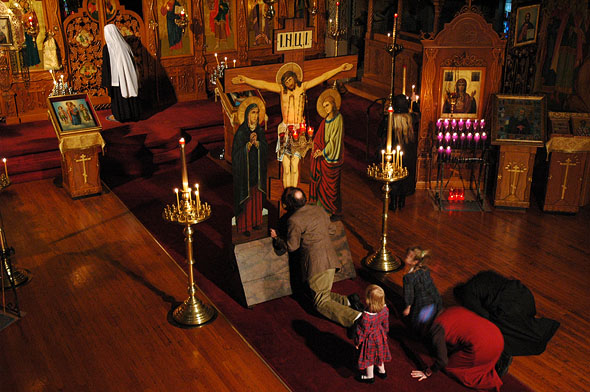On January 7, 2022, my friend Rod Dreher had a post on his American Conservative blog about the direction Pope Francis is trying to take the Catholic Church. Rod went on to say: <<For the time being, American Orthodoxy is not as vulnerable as American Catholicism is to liberalizing, but Orthodox would be fools to think we are somehow protected. I brought this up to an Orthodox priest once, who said…he wasn’t worried about us Orthodox. I think that is whistling past the graveyard.>>
I sent Rod an email explaining why I thought there were several reasons Orthodoxy has a stronger chance of resisting the cultural landslide. He asked to publish it on his blog, so you’ll find what I wrote in his blog post linked below (January 10, 2022). My bit begins about a third of the way down. I’ll also provide the text below.
+ + +
FMG to Rod Dreher:
Rod, I think there are a few reasons we can trust Orthodoxy will stand firm under the coming onslaught.
- The first has to do with theology. My family left our mainline denomination when bishops started preaching strange things, like denying the Resurrection. We found in Orthodoxy a church where theology can’t be changed. I’ll explain why that’s so below.
But I want to be clear I’m not claiming it’s the perfect Church. The Orthodox Church is as susceptible as any other church to temptations of power. Our leaders aren’t infallible. But the main thing my husband and I were seeking was theology that won’t change, and we found it.
In the West, we think of theology as something that comes from theologians, kind of like milk comes from cows. They’re the experts who can rephrase an ancient faith for a new generation. The Catholic Church holds a vast treasury of stable, unchangeable written doctrine—but theologians are expected to ponder it, explore it, discover new ways of looking at things, and come up with the language to reconcile the old with the new.
As a Catholic child in the 1950s, for example, I was taught that no one could go to heaven without a Catholic baptism. It was a scary thought, and one that probably caused my Catholic ancestors some heartbreak over the centuries. But if the Church said it, it was true.
Today, if you pursue this question in the Catholic Church, you’re more likely to hear that wanting to know God is what’s important. That should be seen as faith like a mustard seed. It might be sufficient for salvation, even without faith in Jesus, even in a faith that explicitly rejects Jesus.
That idea will definitely go down more smoothly in modern times. But it’s not what small-o orthodox Christians have believed for the last couple of millennia. How could one thing be true then, but not true now?
This indicates a built-in problem with the system. Theologians, like all academics, have to keep coming up with original things to say. If you just kept repeating the words you received from your old professors, it would get you nowhere. What you need is fresh, even daring, new material. And that means theology will always be in flux.
A venerable Catholic theologian once told me, with great irritation, “Lay people don’t understand what theology is!” They think it’s set in stone, he said, but it’s always evolving and progressing. He seemed to think that theology was something lay people could never hope to keep up with. Their meddling was annoying. They should get out of the way, and wait for the professionals to tell them what the new thinking is.
Theology has a completely different basis in Orthodoxy. It doesn’t change, because it is the faith taught by the Apostles themselves; Orthodoxy is the unbroken continuation of the Church founded by Christ, and carried by the Apostles into the world. We do keep repeating the words we received from our teachers and elders in Christ. Orthodoxy doesn’t need updating, because it provides everything a person needs to be saturated with the presence of God (a process called “theosis”). It fits the needs of every human being like water and air do, no matter what culture or time.
And we have proof: there are men and women alive today, as in every age, who are so filled with the presence of Christ that they are wonder-workers. Those who persevere on this challenging road will do the works that Jesus did (John 14:12). Since we recognize these living saints in every time and place, we know that the theology of the Orthodox Church works.
(BTW, the various jurisdictions, like Greek or Antiochian Orthodox, practice the same faith and are in communion with each other. The different terms come from a century ago, with immigration from different homelands. Today most churches worship in English, and most congregations are an American-style mix of backgrounds.)
I think this idea, that theology “works,” just doesn’t occur in the West. We don’t think of theology as having practical, visible results; it’s a purely intellectual pursuit. But what we believe shapes us and guides us, whether we realize it or not. I asked a man who’d been Orthodox all his life what one word he would use to describe it. He said “Organic.” It’s a good one.
This different understanding of what “theology” is reveals the difficulty of reuniting the Orthodox and Catholic Churches. For Catholics, “unity” means that the Orthodox would acknowledge the headship of the pope, and would otherwise be allowed to follow their own worship and theology. But for Orthodox, “unity” means unity of belief; there can be no unity apart from coming into the unbroken stream of faith from the time of the Apostles.
The noted sociologist of religion Peter Berger observed that Orthodox and Catholic theologians had met and come up with statements both sides could accept—but it wouldn’t make any difference to church members. “The little old babushka who kisses the icon knows that what she does is different from the Catholics down the road.” He said, “In a nasty moment, I called many such negotiations ‘border negotiations between nonexistent countries.’”
- Orthodox theology is taught through worship. Many of the early Christians were poor and illiterate, so the services are packed with Scripture, and go deep into history and theology. It’s all set to music, and important verses may be repeated two or three times. The whole interior of a church (ideally) serves as a picture bible, the walls and ceiling covered with paintings of the events and people of the Bible and church history. If you want to learn the Orthodox understanding of something, Christ’s Ascension maybe, you wouldn’t consult a contemporary writer; you’d look up the prayers, hymns, and icons of the day.
This worship can’t be changed. Nobody has the authority to change it. Over the centuries this unchanging worship was carried everywhere by missionaries, and always translated into the local language (in 4th century Rome, translated into Latin). As a result, Orthodoxy is astonishingly consistent everywhere it is practiced. (I do mean practiced). It’s the same, no matter where you drop in, circling the world or spanning the centuries.
No Western church has such unity. In fact, nearly every Western church changed its worship in recent decades, shifting the focus from God to the needs of the worshiper. With that, authority disappeared.
- What holds Orthodox people together is community memory—a memory of the faith continuous from the time of the Apostles. No one can go back in time and change that memory. Someone who tried would only demonstrate that he had left the community.
There’s a story that illustrates this. There was an Orthodox pastor in Brooklyn who, in 1893, went to the World’s Parliament of Religions in Chicago. While there he shared his opinion that all religions are equal, and it doesn’t matter which one you believe. When he got home, he put his key in the church door and it wouldn’t turn. His parishioners had already changed the locks on him.
In the West, theology is something lay people receive from the experts. But in Orthodoxy, preserving the common faith is everybody’s job. St. Basil (d. 379) told of Orthodox laity gathering for worship in snowy fields, when all the churches were pastored by heretics. That’s the spirit.
Of course, there are Orthodox people who write in support of one change or another (perhaps that of revised sexual morality—more on that below). It occurred to me recently that there was something that the authors of such pieces almost always have in common: they’re associated with a college or university. That’s a setting where new ideas chase each other down the halls.
Anyone’s free to write whatever he wants, of course, but the influence of such people doesn’t extend very far. You’re not going to convince Orthodox lay people that the Church has been wrong about something for 2000 years. We don’t need to defend the Church; the stability of the Church, in fact, surrounds and supports us. Those who want to argue can be treated with love, patiently answered, or (my favorite) ignored.
My husband and I, some 30 years ago, were looking for a church that would stand by the ancient faith. (“Have a Nicene day!” a friend’s t-shirt said.) We found what we were seeking. We can be confident that Orthodox theology will never change.
- But the main controversy today regards sexual morality. The Orthodox Church always has, and always will, teach that everyone is called to chastity. That term means, in the case of the unmarried, celibacy; for the married (heterosexual only), chastity means being faithful, and treating each other with love and respect.
No matter what sexual desires are new topics of conversation, they are not new desires. Humans have always felt a variety of sexual desires, and the Orthodox Church has always guided them in one-to-one spiritual direction that is both private and personal. The Church’s teaching on sexuality is not mere theory, but practical wisdom gained from many centuries of experience in seeing what helps or hinders union with Christ.
The Catholic Church has some large organizations promoting the LGBT cause, like Dignity and New Ways Ministry. Pope Francis has written admiringly of New Ways. Orthodoxy has no such prospering, media-friendly organizations. The websites of Orthodox jurisdictions offer support for traditional morality, including clear statements from our bishops. (You might not hear about them; the media takes no notice.)
But a young person dealing with unwanted desires, and wondering how he should live as a faithful Christian, is not likely to look up the bishops’ official statements. The amount of time any of us spend in the Church’s teaching, or in worship, Scripture, and prayer, is far outweighed by the time we spend soaking in liquid modernity. We’re constantly being nudged toward seeing anything old-fashioned as narrow-minded and absurd. This person is most likely to take his questions to his parish priest.
It’s a huge responsibility for a priest to bear. He may know clearly what he believes, but not know how to express it, not in terms that the world could understand. But if he can regularly communicate the principle of chastity to his flock in general, all the more-personal matters can be discussed in confession.
We all go to confession. We all sin and struggle. We fall and we get up, we fall and we get up, over and over. In Orthodoxy, awareness of yourself as a sinner is the key to gratitude and joy, because God forgives us freely, and loved us so much that he gave his Son.
What someone tells the priest in confession is nobody else’s business. As we say about fasting, “Keep your eyes on your own plate.” A priest can make his own job easier by preaching and teaching what the Church knows by experience: that chastity is beautiful, and charged with spiritual power. Chastity is worth struggling for.
- Orthodoxy in America is enjoying an advantage that’s simply a feature of the times. While there are some Orthodox parishes where the congregation is shrinking (and aging), in others it is growing, due to an influx of converts. And there are a lot of them. These statistics aren’t recent, but they roughly hold true: converts make up around 50% of the membership in the Greek Orthodox and Orthodox Church in America (Russian roots) jurisdictions, and in the Antiochian jurisdiction, 73% of the clergy are converts.
In the churches they join, converts will meet the other 50%, who have been practicing the Orthodox faith all their lives. These experienced ones can pass on the things converts can’t get out of books, and show them how to put their new faith into practice.
What converts bring is passion and dedication, which revitalizes any church. There’s also a curious phenomenon, that the majority of inquirers are men (with a surge during covid, pastors say), and they’re looking for structure, deep tradition, and a challenge. Converts are likely to be well-read, and have a good understanding of the Church’s theology and history. They’re an asset to any church.
Orthodoxy in America is in revival, and that makes it a lively place to be. In other times and places revival has been a temporary state, so it can’t be expected to last forever. At the moment, though, it’s a great time to become Orthodox.

















